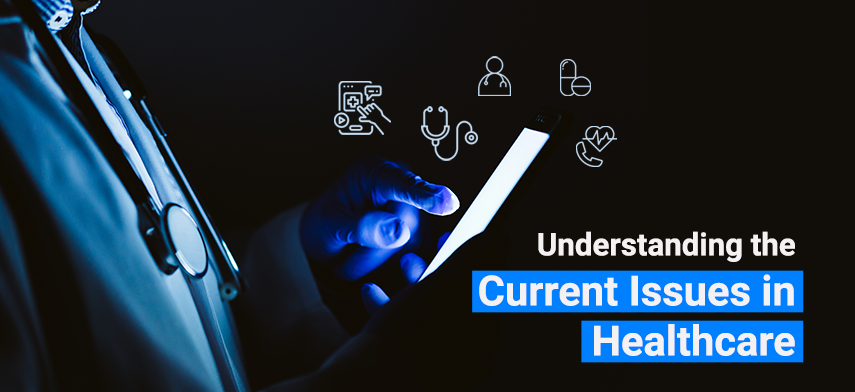Society has always been a factor in shaping our lives. The current issues in healthcare are influential to every aspect of our health and wellbeing, including the treatment we receive from our providers and our physical and mental health concerns. Seeking to take care of our health is a value we cannot escape.
The healthcare sector has been constantly facing challenges and every day a new threat is posing itself of healthcare businesses, whether big or small. The rapidly evolving regulations of the government to recover from the pandemic, the inclusion of digital innovation in healthcare, and improvising on the patient expectations and experience are creating a new landscape for healthcare practices.
Looking ahead in 2022, several challenges will be faced by healthcare industries and how businesses can help to retain the impact and stay ahead of the curve.
Top Healthcare Concerns in 2022
The healthcare leaders and their delivery systems keep facing several challenges in healthcare. 2022 calls for more flexibility in healthcare responses to deal with extraordinary changes. The top healthcare concerns and current social issues are:
1 Concerns with cybersecurity
Data breaches and ransomware threats are not new in the healthcare industry. The pandemic revealed the vulnerabilities of sensitive patient health information. Digital health initiatives including telehealth visits contributed to the breaching of patient records in the past years. With more digital innovation in healthcare, businesses are determining better ways to ensure enhanced protection of patient health information from third-party threats. The current issues in healthcare in correspondence to cybersecurity are predicted to continue. It is expected of decentralized systems to be more vulnerable to these attacks but ensuring proper security protocols are in place, patient sensitive data can be protected. Integrating multi-factor authentication and consistent and strong firewalls can reduce the breach of data security.
2 Telehealth healthcare issues
The pandemic reduced in-person interaction causing challenges in healthcare delivery. The adoption of telehealth grew rapidly from 2019, especially with uncertainty. The telehealth sector is still facing major issues with cybersecurity breaches, challenges with patient data storage, and a possibility of a digital healthcare bubble that can imply uncertain regulatory correspondence in the future.
3 Payment processing concerns
A current social issue in healthcare is the citing of patient data collection by medical practices via revenue cycle management problems. Patients are now responsible for a bigger portion when concerning their medical bills and payments. Providers are leaning towards offering preferred modes of payments to their patients, to submit these bills in a timely fashion. For improving user experience and meeting patient expectations, billing statements and modes need to be user-friendly via online transactional methods integrated with the newest technologies. It can be challenging and expensive for healthcare practices and practitioners to set up intricate invoicing and payment processes. The current issue in healthcare regarding payment is detrimental to building infrastructure and negotiating terms and conditions with each payment vendor while maintaining patient data protection by following rigid guidelines for avoiding unnecessary payment-related penalties.
4 Transparency maintenance in pricing
Due to the lack of pricing transparency, patients are missing or failing to pay their medical dues. CMS announced a rule in 2021 that required hospitals and healthcare facilities to negotiate pricing structures with their insurers for every medical procedure. Several healthcare systems have opted in making the price transparency accessible to patients, many are failing to comply with this rule. Only 5.6% of hospitals in total were successful in complying with this mandate. When a healthcare system decides to not disclose its pricing, patients and consumers will immediately drop them from consideration. The transparency maintenance of pricing will continue to be a challenge in healthcare systems and for patients in the new year.
5 Big data concerns in healthcare
Another top healthcare concerns include Big Data integration. With more healthcare data being churned out and distributed amongst various healthcare systems, providers, payers, and patients, there is no way providers can utilize the optimization of the patient experience. Healthcare data comes in various formats, and there isn't a single system or digital infrastructure to store, analyze, and retrieve this data at a higher scale to generate precise insights. This poses a challenge for healthcare providers. To harness big data integration in healthcare organizations, it needs to be equipped with data-driven decision-making processes. Using analytics intertwined with the culture of an organization to develop trust for data to utilize and support the decision-making process with big data, is still a challenge that needs to be addressed.
6 Challenges with patient experience
The landscape in medical insurance experienced various significant transformations. Healthcare facilities are facing extreme competition for retaining and attracting their patient base. Patients being in charge of their healthcare requirements are demanding a more streamlined patient experience. The social issues in healthcare including patient experience challenges can impact the satisfaction patients require. Healthcare organizations need to build up a centralized location to store patient information and avoid any fatal mistakes or medicine interactions.

Challenges in Healthcare Shaping the Industry in 2022
The shift in preferences of patients and consumer behavior has rapidly evolved due to the integration of evolving digital innovations in healthcare. The implementation of new care delivery models and innovations in clinical findings have continued to remain the main agenda for healthcare business leaders at a global level.
Let’s have a look at the current issues in healthcare that will help in reshaping the industry in 2022.
Prioritizing health equity
Health equity remains a top healthcare concern for business owners and executives. Seniors in the industry have identified the need to intermix mental, social, emotional, clinical, physical, and spiritual health requirements is important. It cannot be influenced by just healthcare remedies, but with assistance from environmental and socio-economic factors. Although there is a large-scale disparity and discrimination in offering accessible healthcare facilities, it has shed a prominent light on how health equity is viewed. Several steps in attaining a health equity strategy can be taken by healthcare organizations to define it. Health equity needs to expand across 4 main domains including the organization, the community, the ecosystem, and the offerings.Resilient strategies to curb environmental, governance, and social issues in healthcare
There are still healthcare organizations and hospitals that do not have adequate energy or efficiency for their health delivery setups. With digital innovation in healthcare, it is time for healthcare leaders to have the necessary targets in reducing the carbon footprints and incorporate resilient strategies to protect environmental, social, and governance issues in society. Healthcare organizations are in creating resilient ecosystems, improvising the infrastructure, altering supply chain management, and incorporating a proper workforce to withstand any calamities. To curb climate-induced health issues, healthcare organizations are improving their offerings to meet the needs of the patients.Bringing mental health to the forefront
The pandemic has pushed mental health and wellbeing to the forefront. One of the social issues in healthcare for mental health was the lack of timely access to affordable and quality services when it comes to mental wellbeing. Public awareness since the pandemic has emerged and with more attention, digital technologies like telehealth and telemedicine services have helped transform the forefront of mental health accessibility. It has also made the services affordable and accessible for people across all communities.Digital innovation in healthcare
Digital technologies have played a major role in transforming the healthcare industry, especially during the pandemic. It encouraged providers and healthcare leaders to rethink their strategies and rapidly switch to virtual care delivery models. Digital innovation in healthcare has been deemed essential for the industry as it puts the patient at the center of the services. Investing in cloud computing services and adopting new technologies can help with the blending of hybrid models including in-patient care, telehealthcare, and home-based care models.Advancement in medical science
The growth of medical science has been exponential, accelerated by the COVID-19 pandemic. Although scientific research and discovery can be expensive, healthcare leaders are looking for a balance that benefits both medical sciences and digital innovation in technology. It will also include technological innovation in reaching communities without proper healthcare access.Reimagining public health and awareness
The inherent stresses on public health created opportunities in reimaging the future of healthcare. The current social issues involving public health and awareness are being rethought and digital transformation is being incorporated. The services are now more patient-centered in their approach. Increasing public health awareness across private and public healthcare providers can be a significant step in digitizing healthcare offerings. Healthcare outcomes depend on many factors, but by reimagining, public health and awareness can improve the combined effects of housing, healthcare provisions, and education.
Final thoughts,
The current issues in healthcare will reverberate through our communities even with effective treatment strategies. Having providers who can deal with the aftermath of the pandemic can help to ensure better healthcare delivery in the face of a crisis. Incorporating new digital cues to tackle the current issues in healthcare implies better health outcomes. It is not easy to remedy inequities that are already existing, but it is necessary to immediately tackle a rising crisis to overcome healthcare issues. Improving patient experience and minimizing expense errors is something we should focus on for delivering higher quality healthcare services. Challenges in healthcare will be a persistent occurrence and social issues in healthcare will keep arising, but having the knowledge and digital front door to tackle such situations will become mandatory in years to come.





 March 1, 2022
March 1, 2022


